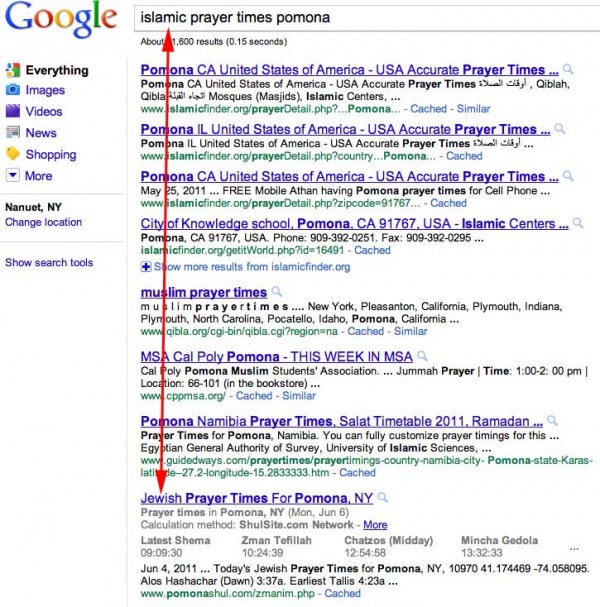Google’s Prayer Time Rich Snippets: The Good & Bad
A little over a month ago, Google announced a new rich snippet markup for prayer times. I was very intrigued by this rich snippet because of the complexities behind how prayer times for both the Islamic and Jewish faith work. In short, if you do a search asking Google for prayer times in a location, […]
A little over a month ago, Google announced a new rich snippet markup for prayer times. I was very intrigued by this rich snippet because of the complexities behind how prayer times for both the Islamic and Jewish faith work.
In short, if you do a search asking Google for prayer times in a location, Google will show a listing of search results that match the query and then show the rich snippet data if the ranking page has utilized the rich snippet markup. The example given by Google was [Islamic prayer times in London], which returns a result that looks like this:

Are The Times For Islamic or Jewish Religions?
My big question was how does Google differentiate between Islamic and Jewish prayer times? Looking at the technical documentation it says “prayer times format can be used by any religious organization” but the markup gives us no way to specify if it is Jewish, Islamic or another religion.
The truth is, Google does not differentiate between any religion. Instead, they hope that a search for Islamic prayer times in a city returns only pages that should rank for that religion. Same with Jewish and other religions. So I decided to test this, but the only way I could test this was to seed Google with Jewish prayer times, since no one has. That led to some other issues which I will get to later.
So I added this markup to a synagogue’s Jewish times page, which, in full disclosure, is part of a new project named ShulCloud I launched and after some back and forth with Google, the rich snippet started to show up last week.
Prayer Times Are Showing For Wrong Religion:
In fact, searching for [isalmic prayer times pomona] and [jewish prayer times london] return the wrong religions.
Here are screen shots showing the issue:
As you can see from the screen shots, since we have no way to specify which religion the prayer times are associated with – Google just shows the rich snippet data if the content tends to rank. I have to assume, Muslims looking for prayer times will know right away that Jewish times are showing and Jews looking for prayer times will know right away that Islamic times are showing.
A Google spokesperson told me “this feature is dependent on sites adding the cities and on the ranking of the site. So if your site does not have a specific city and you are the only Jewish site, then the feature will not work. On the other hand, if let’s say, your site adds a city where your site is not highly ranked, the result might not be on the first page. ”
Why Aren’t My Prayer Times Showing? Google Requires Whitelists.
As I mentioned above, it took some back and forth for the ShulCloud network to show prayer times. Why? Well after some back and forth, I was instructed by Sarah at Google via a Google Web Search Help Forum thread to email the Google engineer who was responsible for this at [email protected]. I did, and Essam from Google worked out some kinks and then had to Whitelist the sites in the network to enable them to show this rich snippet prayer times details in the search results.
Yes, if you want your prayer times to show in the Google results, you must email Google to whitelist you. No, the documentation makes no mention of whitelists are emailing Google for inclusion. I was lucky because of my contacts at Google to figure this out.
Are Prayer Time Rich Snippets A Good Thing?
That is a tough question but overall, I have to say yes – they are a good thing.
I can’t talk for the Islamic religion but in Judaism there are different religious sects that hold by different calculation methods for those times. Google handles this well by displaying the “Calculation method” in the rich snippets markup. But I know that most Jews wouldn’t know the calculation method’s source to be one way or another.
Also, as illustrated above, the issue with Jewish and Islamic times showing up for queries that should only return one religion can be an issue. Like I said, most Jews and Muslims would know the difference, but it can lead to confusion.
I am glad to see Google note on the technical documentation “Google is experimenting with the display of different kinds of structured information in rich snippets. This format may change at any time.” I think after a few more tweaks, including specifying religion and telling webmasters how they can be included on this whitelist, we will have a nice new rich snippet to work with.
Related Stories:
- Schema.org: Google, Bing & Yahoo Unite To Make Search Listings Richer Through Structured Data
- New: Google Showing Recent Stories From News Sites With News Snippet
- Rich Snippets Finds Its Way To Google Places/Maps
- Google Search Now Supports Microformats and Adds “Rich Snippets” to Search Results
- Google Takes First Big Bite Into Rich Snippet Search With Recipes
- Google Adds Recipes To Rich Snippet Markup
- Google Now Showing Rich Snippets For Shopping Sites
Related stories
New on Search Engine Land


